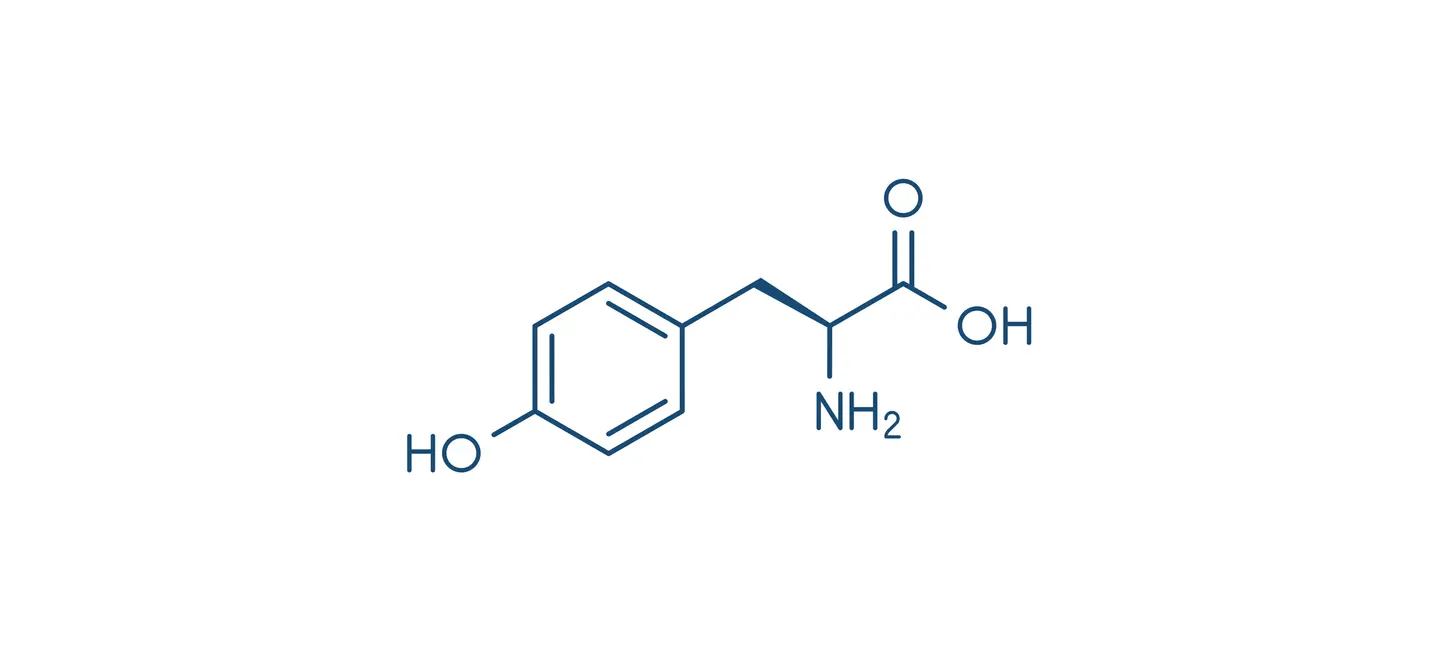
Tyrosine is a type of amino acid, which are the building blocks of protein. The body makes tyrosine from another amino acid called phenylalanine.
In the diet, tyrosine can be eaten in dairy products, meats, fish, eggs, nuts, beans, oats, and wheat.
The body uses tyrosine to make chemical messengers that are involved in conditions affecting the brain, such as mental alertness.
People most commonly use tyrosine in protein supplements for an inherited disorder called phenylketonuria (PKU). It is also used for alcohol use disorder, cocaine dependence, and memory and thinking skills, but there is no good scientific evidence to support most of these uses.
Is It Effective?
NatMed Pro rates effectiveness based on scientific evidence according to the following scale: Effective, Likely Effective, Possibly Effective, Possibly Ineffective, Likely Ineffective, Ineffective, and Insufficient Evidence to Rate.
- An inherited disorder that increases levels of phenylalanine in the blood (phenylketonuria or PKU). People with PKU are not able to process the amino acid phenylalanine. This amino acid is used by the body to make tyrosine. To prevent tyrosine levels from becoming too low, people with PKU are advised to consume medical foods that contain tyrosine and very little phenylalanine.
- Memory and thinking skills (cognitive function). Taking tyrosine by mouth might improve mental performance under stressful conditions.
- Memory. Taking tyrosine by mouth seems to improve memory during stressful situations.
- Athletic performance. Taking tyrosine by mouth before running or cycling doesn't seem to improve performance.
There is interest in using tyrosine for a number of other purposes, but there isn't enough reliable information to say whether it might be helpful.
Is it Safe?
When taken by mouth: Tyrosine is commonly consumed in foods. Tyrosine is possibly safe when taken as a medicine, short-term. It seems to be safe when taken in doses up to 150 mg/kg daily for up to 3 months. Some people experience side effects such as nausea, headache, fatigue, and heartburn.
When applied to the skin: Tyrosine is possibly safe when applied to the skin.
Special Precautions & Warnings:
Pregnancy and breast-feeding: There isn't enough reliable information to know if tyrosine is safe to use when pregnant or breast-feeding. Stay on the safe side and stick to food amounts.
Thyroid disorders: The body uses tyrosine to make thyroxine, a thyroid hormone. Taking extra tyrosine might increase thyroxine levels too much. This could make hyperthyroidism and Grave's disease worse. If you have a thyroid disorder, don't take tyrosine supplements.
Levodopa
Interaction Rating=Moderate Be cautious with this combination.
Tyrosine might decrease how much levodopa the body absorbs. By decreasing how much levodopa the body absorbs, tyrosine might decrease the effects of levodopa. Do not take tyrosine and levodopa at the same time.
Thyroid hormone
Interaction Rating=Moderate Be cautious with this combination.
The body naturally produces thyroid hormones. Tyrosine might increase how much thyroid hormone the body produces. Taking tyrosine with thyroid hormone pills might cause there to be too much thyroid hormone. This could increase the effects and side effects of thyroid hormones.
There are no known interactions with herbs and supplements.
There are no known interactions with foods.
In the diet, tyrosine is found in dairy, meats, fish, eggs, nuts, beans, oats, and wheat. In supplements, tyrosine has most often been used by adults in doses of 100-300 mg/kg by mouth daily. Speak with a healthcare provider to find out what dose might be best for a specific condition.
2-Acetylamino-3-(4-Hydroxyphenyl)-Propanoic Acid, Acetyl-L-Tyrosine, Acétyl-L-Tyrosine, L-Tyrosine, N-Acetyl L-Tyrosine, N-Acetyl-L-Tyrosine, N-Acétyl L-Tyrosine, N-Acetyl-Tyrosine, N-Acétyl-Tyrosine, Tirosina, Tyr, Tyrosinum, 2-amino-3-(4-hydroxyphenyl)propionic acid.
Information on this website is for informational use only and is not intended to replace professional medical advice, diagnosis, or treatment. While evidence-based, it is not guaranteed to be error-free and is not intended to meet any particular user’s needs or requirements or to cover all possible uses, safety concerns, interactions, outcomes, or adverse effects. Always check with your doctor or other medical professional before making healthcare decisions (including taking any medication) and do not delay or disregard seeking medical advice or treatment based on any information displayed on this website.
© TRC Healthcare 2024. All rights reserved. Use and/or distribution is permitted only pursuant to a valid license or other permission from TRC Healthcare.
